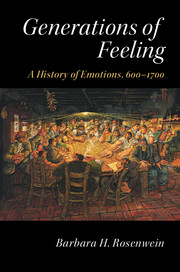Book contents
- Frontmatter
- Dedication
- Epigraph
- Contents
- List of plates
- List of figures
- List of maps and genealogies
- List of tables
- Prefatory note
- Acknowledgments
- List of abbreviations
- Introduction
- 1 Ancient theories
- 2 Attachment and detachment
- 3 Alcuin's therapy
- 4 Love and treachery
- 5 Thomas’ passions
- 6 Theatricality and sobriety
- 7 Gerson's music
- 8 Despair and happiness
- 9 Hobbes’ motions
- Conclusion
- Bibliography
- Index
2 - Attachment and detachment
Published online by Cambridge University Press: 05 November 2015
- Frontmatter
- Dedication
- Epigraph
- Contents
- List of plates
- List of figures
- List of maps and genealogies
- List of tables
- Prefatory note
- Acknowledgments
- List of abbreviations
- Introduction
- 1 Ancient theories
- 2 Attachment and detachment
- 3 Alcuin's therapy
- 4 Love and treachery
- 5 Thomas’ passions
- 6 Theatricality and sobriety
- 7 Gerson's music
- 8 Despair and happiness
- 9 Hobbes’ motions
- Conclusion
- Bibliography
- Index
Summary
The emotion words and theories of Cicero and Augustine lasted long after the last Western Roman emperor was deposed in 476. That was true for the elites in the provinces as well as in Rome itself. Yet such persistence hides a fact of equal importance: that different emotional communities did not deploy this heritage in the same way. There were in Gaul in the late sixth through seventh centuries at least three distinct emotional communities. In Austrasia the elites celebrated sentimental feelings of every sort, drawing on almost all of the vocabulary listed in Chapter 1. In Neustria just a bit later, however, the elites defined themselves (largely in reaction to the Austrasians) by their emotional detachment – except when heaven was their focus. They drew gingerly on words of love. Finally throughout Francia (as we may now call it) late seventh-century authors writing (again) for the elites emphasized the demonstrative emotions such as envy and anger. (For all the place names in this chapter, see Map 2.1.)
Family feeling in Austrasia
Clovis (d. 511), the Merovingian king who united Gaul under his rule, left his kingdom to four of his sons. Fractured by civil wars, the kingdom was eventually reunited under Clothar I after his brothers predeceased him. When he died (in 561), it was divided in turn among his surviving sons, Charibert (561–67), Guntram (561–93), Sigibert (561–75), and Chilperic (561–84).
The elites of Sigibert's kingdom, centered in the region later called Austrasia, cultivated an emotional style that may be glimpsed in the writings of Venantius Fortunatus (c. 535-c. 605) and Gregory of Tours (c. 538-c. 594). Fortunatus studied in Ravenna, read the classical and patristic authors, and schooled himself in Virgilian poetry. Arriving at Sigibert's court in 565, he earned his living as a writer under the patronage of kings, bishops, and other members of the elites there. Around 567 or 568 he settled at Poitiers, where he became a priest and the friend of the nuns at the monastery of the Holy Cross. In c. 600 he became bishop of Poitiers. His contemporary Gregory of Tours, born in Clermont, was probably educated in the household of his great-uncle Nicetius, bishop of Lyon. Even so, he well knew the techniques of classical rhetoric as well as the writings of the Church Fathers and, above all, Scripture.
- Type
- Chapter
- Information
- Generations of FeelingA History of Emotions, 600–1700, pp. 35 - 66Publisher: Cambridge University PressPrint publication year: 2015



